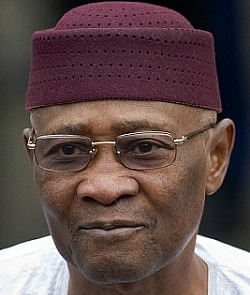
The Republic of Mali or "Mali" for short, is a landlocked country located at the interior part of West Africa surrounded by the People's Democratic Republic of Algeria to the north, the Republic of Niger to the east, the Republic of Senegal and Mauritania to the west, the Republic of Guinea to the southwest, and the Republics of Burkina Faso and Ivory Coast to the south. As it's name implies, the Republic of Mali was named after the great ancient Malian empire which ruled the region c.1230-1670.
The Republic of Mali has a total land area of about 1,240,192sq.km (about 20,000sq.km of which is covered by water). Just about 3.76% of the total land area of Mali is arable (agricultural land or land good for farming). Although Mali is landlocked and mostly desert, two major rivers (the Senegal and Niger Rivers) run through the southern part of Mali (where the majority live) providing enough fresh water for several of the southern communities. Fishing plays a major role in Mali's economic structure thanks to these and several other rivers in the southern parts of the country.
The Republic of Mali has a total population of about 15 million people with the population growth rate around 2.6%. About 36% of the population lives in urban areas in major cities such as Bamako the capital of Mali. Bamako contains about 2 million people.
There are several ethnic and racial groups living in Mali today. The Mandes (including Bambaras, Malinkes, and Soninkes) form about 50% of the total population. Peuls make up about 17%, Voltaics about 12%, Songhais about 6% of the total population. Tuaregs and Moors form just about 10% of the total population. Islam remains the most dominant religion in Mali today with about 90% of the total population being Muslims. Christians form just about 1% of the total population. Indigenous believers make up the remaining 9% of the total population. Although French is the official language, about 80% of the total population do speak and understand the Bambara (a local language) and several other African languages which helps a lot in communication.
The Republic of Mali just like its neighboring countries is blessed with abundance of natural resources such gold, uranium, hydropower, salt, phosphates, limestone, gypsum, kaolin, granite, in addition to huge unexploited deposits of iron ore, copper, manganese, bauxite and tin.
However, despite the abundance of Natural resources, the Republic of Mali remains one of the poorest countries in all of Africa with about half of its population living below poverty line. According to World Health Organization, about 27.9% of Malian children under age 5 were underweight in 2006. Mali has a literacy rate of just 26.2% for the total population. In other words, just about 26.2% of Malians above age 15 can read and write which is perhaps the worst literacy rate in the entire world.The female literacy rate in Mali today is even worse. Children of school-going age are out of school and those who are in school learn nothing new. Some study under trees and some do their homework assignments right in the sand why because their parents cannot afford them even writing books and pencils and the poor government does almost nothing good to help. This is how bad the problem of poor education is in Mali today.
Although Mali's HIV/AIDS adult prevalence rate of 1% is far better than in countries like South Africa and Swaziland, about 76,000 people were living with HIV/AIDS in 2009 with about 4,400 deaths recorded within the same year. Besides HIV/AIDS, the deadly malaria, bacterial and protozoal diarrhea, schistosomiasis, typhoid fever and hepatitis A continue to threaten several lives in Mali today.
Rampant deforestation, inadequate supplies of potable water, soil erosion, desertification, poaching, land and water pollution (mainly caused by poor sanitation, improper disposals of agricultural and industrial wastes), etc. include some of the environmental problems facing Mali today.
Just like in most African countries today, political instability (Coup d'etats, etc.), poor governance and corruption continue to tear Mali apart.

